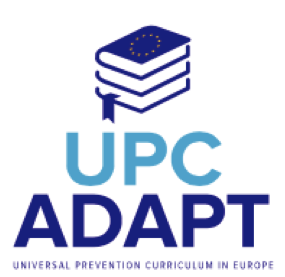UPC-Adapt: Universal Prevention Curriculum in Europe
The overall project objective is to create a programme that supports prevention professionals in Europe (including those who decide about prevention programmes and funding and those who will become professionals) to use the most up-to-date, proven and evidence-based prevention strategies with strong scientific foundations.
Project Objectives:
- To provide European professionals, policy makers and opinion leaders with the latest evidence-based prevention training.
- To ensure the curriculum is suitable and can be implemented across different European prevention systems.
- To open up opportunities and access to evidence in prevention in UNODC’s International Prevention Standards and on EMCDDA’s Best Practice Portal.
Project Partners:
PROJECT COORDINATOR: University College Gent (HoGent), Belgium
ASSOCIATE PARTNERS:
- University of Zagreb, Croatia

- Charles University (CUNI), Czech Republic
- National Institute for Health Development (TAI), Estonia
- FINDER Institute for Prevention Research, Germany
- Local Health Agency n. 2 Savonese (ASL 2 Savonese) Mental Health and Addiction Department, Italy
- ATS della Città Metropolitana di Milano, Italy
- State Agency for Prevention of Alcohol-Related Problems (PARPA), Poland
- Institute of Psychiatry and Neurology (IPIN), Poland
- Institute for Research and Development (UTRIP), Slovenia
- University of the Balearic Islands (UIB), Spain
COLLABORATING PARTNERS:
- Applied Prevention Science International (APSI)
- European Monitoring Centre for Drugs and Drug Addiction (EMCDDA)
- European Society for Prevention Research (EUSPR)
Overview:
Developed and piloted in 9 EU Member States (Belgium, Czech Republic, Croatia, Estonia, Germany, Italy, Poland, Slovenia and Spain) over the course of two years from January 2017 to December 2018.
Outcomes:
- The UPC-Adapt team has carefully summarised and developed a condensed version (EUPC) of the original training (UPC), making sure to retain the logic, structure and content of the UPC as far as possible.
- During the first year of the project, the coordinators carried out extensive mapping of current prevention training in Europe, allowing for an overview of existing academic and non-academic prevention training to be realised and gaining an in-depth understanding of the needs of the target group.
- The outcomes and deliverables are put open source and are free.
- The programme has been translated into 9 languages and includes country specific adaptions.
- The training is designed in three distinct modules based on a thorough study phase including focus groups and online surveys. These include a short module (e.g. one week and a follow up session), an extended academic module (e.g. a series of courses in one semester at a faculty), and an online module with an e-learning basis.